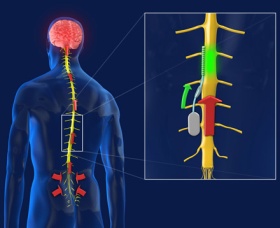Scientists develop painkilling spinal implant

Researchers in Sydney are preparing to conduct human trials of a smart chip that, when implanted in the spinal cord, could measure and stop pain signals travelling to the brain.

Scientists in Sydney are working on a smart chip implant that could measure and stop pain signals travelling to the brain. Photo credit: Nicta
The technology targets chronic pain and has been developed by National ICT Australia (Nicta) over the last two years by experts in biomedical, electrical and mechanical engineering, as well as specialists in textile technology and software applications.
The smart chip is put into a biocompatible device, which is a little smaller than the head of a match. A couple of the devices are then sewn into a 1.22mm-wide micro-lead made from polymer yarn and electronic wires. The wires are then inserted into the spine — or elsewhere — and connected to a device containing a battery and a computer processor. This set-up, according to Nicta, can then measure the properties of nerves carrying pain signals to the brain and can send a 10V electric pulse to block those signals, tricking the brain into thinking there is no pain.
For more on this ZDNet UK-selected story, see Sydney scientists beat pain with spinal chip on ZDNet Australia.
Get the latest technology news and analysis, blogs and reviews delivered directly to your inbox with ZDNet UK's newsletters.